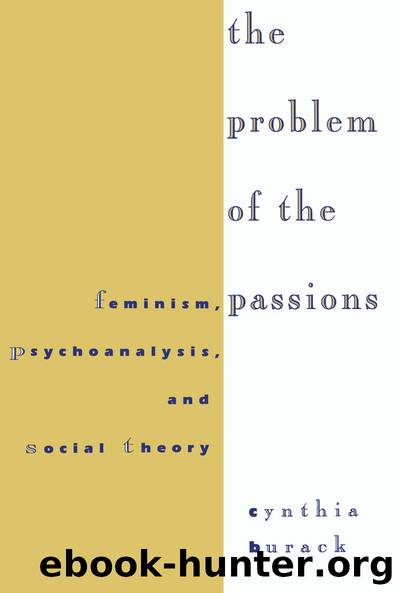The Problem of the Passions by Cynthia Burack

Author:Cynthia Burack [Burack, Cynthia]
Language: eng
Format: epub
Tags: Psychology, Movements, Psychoanalysis, Social Science, Feminism & Feminist Theory
ISBN: 9780814712085
Google: z5hsQgAACAAJ
Publisher: New York University Press
Published: 1994-01-15T04:23:48+00:00
Conclusion
In grounding the abstract self of Kohlbergâs psychology and communitarian politics in the lived reality of relationships, Gilligan has transformed the nature of much social theorizing. In the years since Gilligan first began to develop her vision, her work has been subject to an astounding variety of critiques in numerous academic disciplines. The very range of interest testifies to the ways in which she has stimulated dialogue and reformulation of orthodoxies. Her challenge to psychology has infiltrated a vast range of disciplines and assisted a contemporary revolution in ways of understanding the nature of selfhood.
Even so, Gilligan has successfully explained only one aspect of the hold of relations with others on the self, and that aspect that we are most likely to want to acknowledge about ourselves. The remaining aspects of relations and of the self are quietly pushed backâto the margins of consciousness and social theory. In the end, the absence of a depth psychology limits Gilligan to asserting that relations are foundational to human being but leaves her unable to explain why this is so.
A Kleinian moral theory can provide a way to correct this omission. By acknowledging the ubiquity and functions of the disagreeable passions, Kleinian theory accomplishes much: it does not deny gender differences but instead challenges the theorist to locate differences in the context of the human struggle with the passions; it restores the denied parts of the narrative of feeling to moral and social theory. Far from being identical to the orthodox psychoanalytic theories that Gilligan rejects, Klein takes up the challenge of understanding the dialectic of the formation of selves within social context. This challenge is one that Gilligan has already embraced in articulating and defending her moral vision.
Gilligan is critical of feminist applications of psychoanalytic theory. Nonetheless, the work of Nancy Chodorow and Jessica Benjamin can be understood as continuous with Gilliganâs project of representing the self as relational. These projects diverge not, as Gilligan would have it, because the psychoanalytic method is flawed but because Chodorow and Benjamin more successfully penetrate familiar self-conceptions and cherished social arrangements. They illuminate more, and more problematic, aspects of the self than Gilligan can accommodate.
Download
This site does not store any files on its server. We only index and link to content provided by other sites. Please contact the content providers to delete copyright contents if any and email us, we'll remove relevant links or contents immediately.
Unwinding Anxiety by Judson Brewer(72980)
The Art of Coaching by Elena Aguilar(53171)
The Fast Metabolism Diet Cookbook by Haylie Pomroy(21126)
Rewire Your Anxious Brain by Catherine M. Pittman(18634)
Healthy Aging For Dummies by Brent Agin & Sharon Perkins RN(17033)
Talking to Strangers by Malcolm Gladwell(13341)
The Art of Thinking Clearly by Rolf Dobelli(10410)
Mindhunter: Inside the FBI's Elite Serial Crime Unit by John E. Douglas & Mark Olshaker(9313)
Crazy Rich Asians by Kevin Kwan(9271)
The Compound Effect by Darren Hardy(8919)
Tools of Titans by Timothy Ferriss(8360)
Periodization Training for Sports by Tudor Bompa(8247)
Becoming Supernatural by Dr. Joe Dispenza(8196)
Wonder by R. J. Palacio(8097)
Crystal Healing for Women by Mariah K. Lyons(7921)
Bodyweight Strength Training by Jay Cardiello(7902)
Change Your Questions, Change Your Life by Marilee Adams(7732)
Therapeutic Modalities for Musculoskeletal Injuries, 4E by Craig R. Denegar & Ethan Saliba & Susan Saliba(7710)
Nudge - Improving Decisions about Health, Wealth, and Happiness by Thaler Sunstein(7689)
